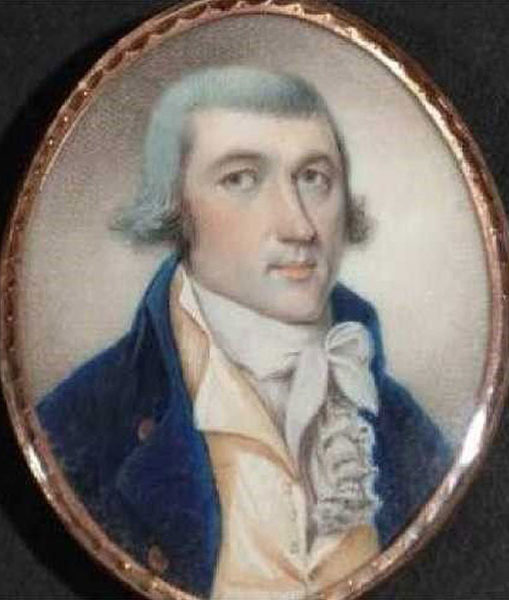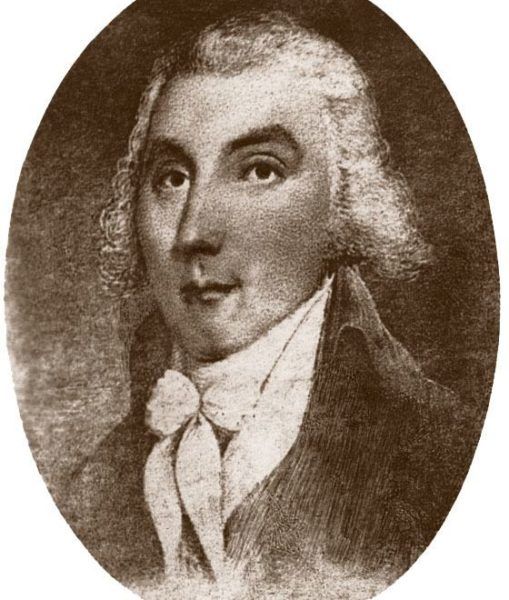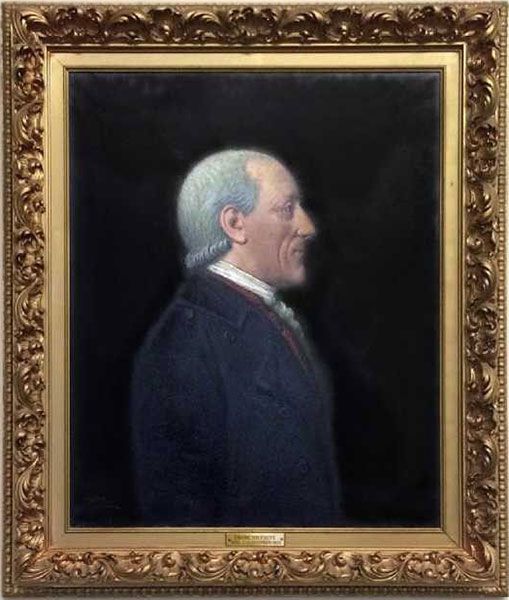November 22, 1754 – March 4, 1807
Abraham Baldwin was born in 1754 in Guilford, Connecticut into a large family. His father was a blacksmith. His half-brother, Henry Baldwin, was an Associate Justice of the Supreme Court of the United States. After attending a local village school, Abraham Baldwin attended Yale University in nearby New Haven, Connecticut, where he was a member of the Linonian Society. He graduated in 1772.
Three years later after theological study, he became a minister. He also served as a tutor at the college. He held that position until 1779. During the American Revolutionary War, he served as a chaplain in the Connecticut Contingent of the Continental Army.
Baldwin apparently served as a chaplain with Connecticut forces on a part-time basis during the early stages of the war, and finally in February 1779 he was appointed as a chaplain in Brigadier General Samuel H. Parsons’ brigade, remaining with the unit until June 1783. The duties of a Revolutionary War chaplain were quite extensive. In addition to caring for the spiritual needs of 1,500 or so soldiers, Baldwin assumed a major responsibility for maintaining the morale of the men and for guarding their physical welfare. He served as a political advisor to the brigade commander and subordinate regimental commanders, and helped the soldiers understand the basis for the conflict and thereby heightened their sense of mission and dedication to the Patriot cause. Although Baldwin’s unit did not participate in combat during the last four years of the war, it still played a major role in Washington’s defensive strategy.
The Connecticut brigades were assigned to garrison duty near West Point where they helped secure vital communications along the Hudson River and guard this critical base area against British invasions. They performed their mission well; the Continental brigades in the Hudson Valley formed the bedrock of Washington’s main army against which no British general was likely to attack. With his center thus secured, Washington was free to launch successful offensive operations against smaller enemy forces in other parts of the country. The soldiers in Baldwin’s brigade eventually trained for an amphibious attack on the British at New York City late in the war, but the plan was not put into effect. Baldwin’s service as a chaplain proved vital to the Patriot cause. Baldwin’s Connecticut brigade had weathered the darkest days of the war, and in other units the deprivations of the long war exacted a toll on morale, leading to desertions and occasional mutinies in the 1780s. The Connecticut units, however, remained among the most reliable. Thanks in great part to the success of leaders like Baldwin, the troops had been thoroughly educated in the nation’s war aims and the need for extended service. As a result, Connecticut stood firm.
Post War
Two years later at the conclusion of the war, Baldwin declined an offer from Yale for a divinity professorship. Instead of resuming his ministerial or educational vocation after the war, he turned to the study of law. In 1783 he was admitted to the bar.
Baldwin was recruited by Governor Lyman Hall of Connecticut to work for the Georgia governor in developing a state education plan. He moved to Georgia, where he became active in politics to build support for a college. He was appointed as a delegate to the Confederation Congress and the Constitutional Convention, and was one of the state’s two signatories to the U.S. Constitution.
Abraham Baldwin was appointed in 1785 to serve as the first president of the University of Georgia during its initial planning phase to 1801. During this period, he also worked with the legislature on the college charter.
In 1801, Franklin College, the University of Georgia’s initial college, opened to students. Josiah Meigs was hired to succeed Baldwin as first acting president and oversee the inaugural class of students.
The first buildings of the college were architecturally modeled on Baldwin’s and Miegs’s alma mater of Yale where they both we educators. Later the university sports team adopted as its mascot, the bulldog, also in tribute to Baldwin and Miegs, as it is the mascot of Yale.
Baldwin was elected to the Georgia Assembly, where he became very active, working to develop support for the college. He was able to mediate between the rougher frontiersmen, perhaps because of his childhood as the son of a blacksmith, and the aristocratic planter elite who dominated the coastal Lowcountry. He became one of the most prominent legislators, pushing significant measures such as the education bill through the sometimes split Georgia Assembly.
In 1787 Georgia called on Baldwin to serve in the Constitutional Convention, and he helped draw up the Great Compromise, whereby all states had an equal voice in the Senate with two Senators each but the rights of the majority in a house of House of Representatives based on population. His role in this compromise was widely recognized and Baldwin himself considered his work in drafting the Constitution as his most important public service.
He was elected as representative to the U.S. Congress in 1788. The Georgia legislature elected him as U.S. Senator in 1799 (this was the practice until popular election in 1913). He served as President pro tempore of the United States Senate from December 1801 to December 1802. He was re-elected and served in office until his death.
Death
On March 4,1807, at age 52, Baldwin died while serving as a U.S. senator from Georgia. Later that month the Savannah Republican and Savannah Evening Ledger reprinted an obituary that had first been published in a Washington, D.C., newspaper: “He originated the plan of The University of Georgia, drew up the charter, and with infinite labor and patience, in vanquishing all sorts of prejudices and removing every obstruction, he persuaded the assembly to adopt it.”
The United States Postal Service made a 7¢ Great Americans series postage stamp in his honor; Places and institutions were named for him, including:
- Baldwin County in Alabama and Georgia;Abraham Baldwin
- Agricultural College in Tifton, Georgia;
- Abraham Baldwin Middle School in Guilford, Connecticut;
- Baldwin streets in Madison, Wisconsin and Athens, Georgia;
The University of Georgia erected a statue of Baldwin on the historic North Campus quad in his honor as its founding father.
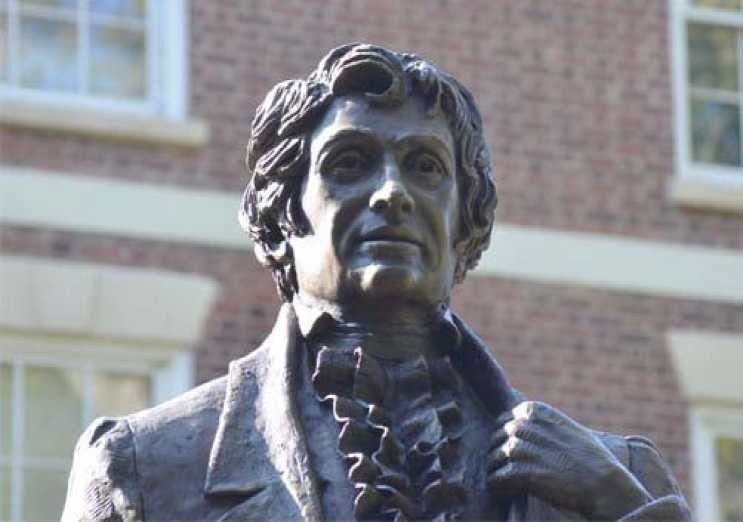
Statue at the University of Georgia
His remains are interred at Rock Creek Cemetery in Washington, DC.
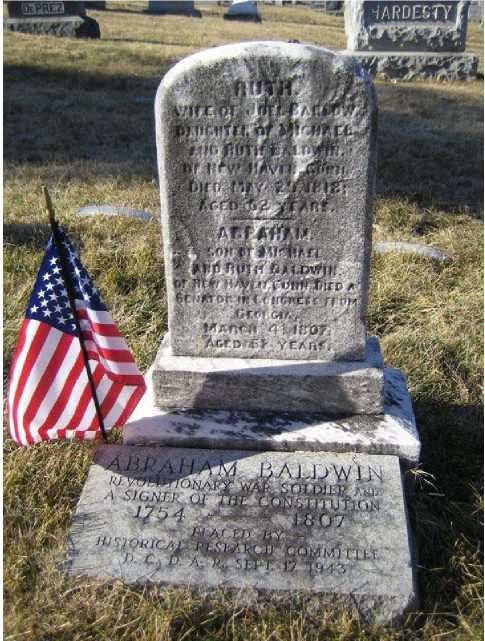
Gravesite of Abraham Baldwin at Rock Creek Cemetery
